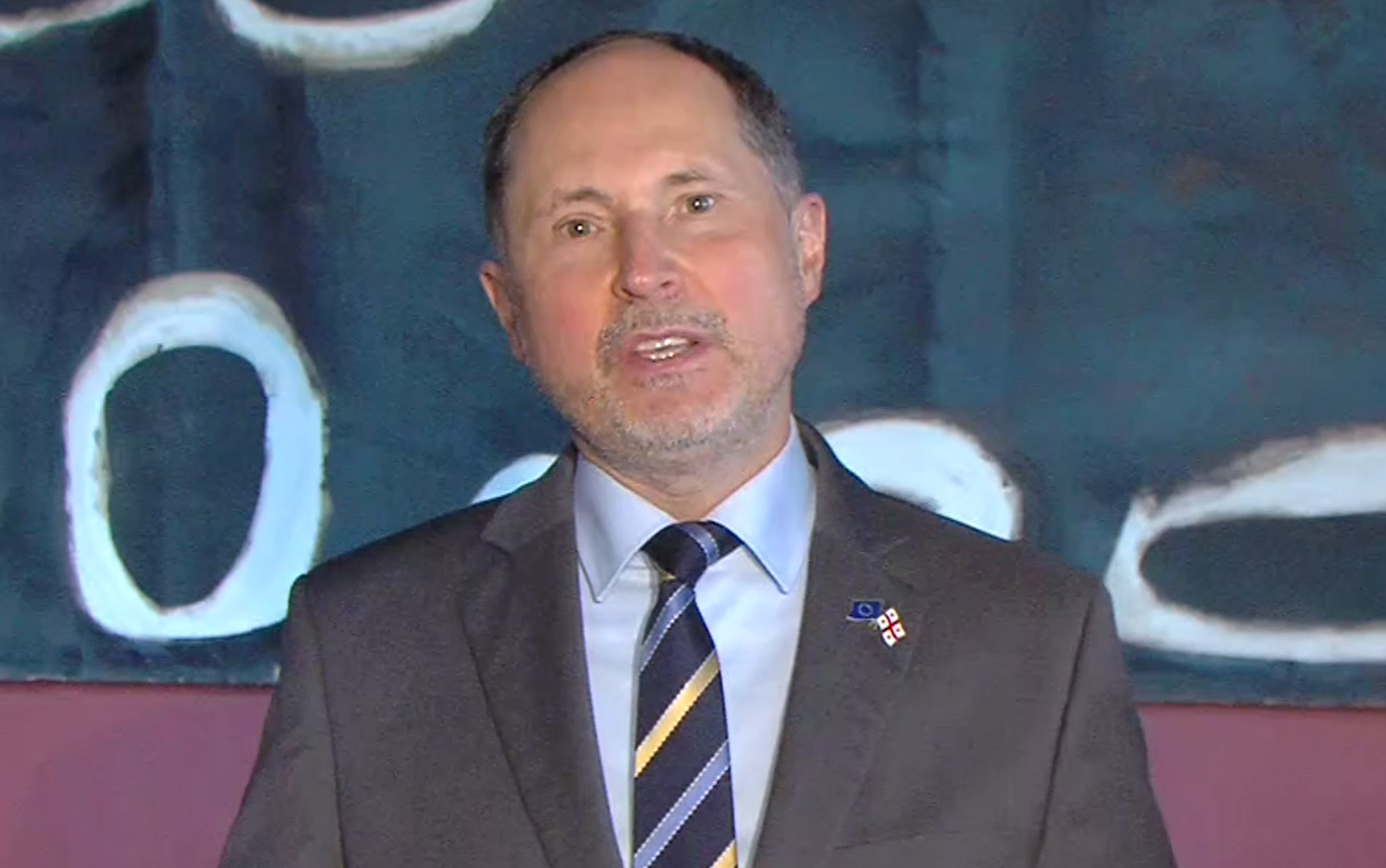The head of EU Delegation to Georgia Paweł Herczyńsky said that the adoption of the Foreign Agents law “has frozen Georgia’s EU integration” and that the EU will discuss the “consequences” of this decision next week at the level of Foreign Ministers, which will be followed by the discussion at the Heads of States’ level.
Paweł Herczyńsky spoke to journalists on June 19 after attending a meeting with the local human rights watchdog Georgia’s Young Lawyers’ Association (GYLA).
Answering the question of what the Ambassador thought about Prime Minister Irakli Kobakhidze’s statement on the Foreign Agents law increasing Georgia’s chances of EU integration, Ambassador Paweł Herczyńsky stated that the reality is the opposite. “…when it comes to EU-Georgia relations, with huge regret, I have to tell you that we are currently undergoing a difficult period in our relationship. We have said repeatedly that enacting the law on foreign influence would adversely affect Georgia’s EU aspirations. Unfortunately, this has happened. Next week, the EU will discuss the consequences.” EU Ambassador added: “This discussion will happen first at the level of foreign ministers, then several days later at the level of [the EU] leaders. So, the Presidents and the Prime Ministers will discuss and will decide what measures we will take in response to those events in Georgia.”
He said: “For sure, prospect of Georgia moving forward has been adversely affected. Basically, adoption this law as I see it, has frozen Georgia’s EU integration.
Regarding the consequences, the Ambassador explained that services of the European Commission and External Action have prepared a “menu of options” of what consequences Georgia might face by the decision of the EU and this list has been sent to each EU member states, who must decide on what option they will support and come to a decision with other member states during the meetings on Foreign Ministers and Heads of States level.
In addition, he underlined that opening accession negotiations with Georgia now depends on the EU member states decision, some of whom had clearly stated that if Georgia enacted the law, they wouldn’t support it. “…and what I want to add, this is happening in the context of Ukraine and Moldova opening accession negotiations precisely next week. So, it’s really heartbreaking to see that the integration process of Georgia into the European Union is practically stopped, is practically frozen and at the same time we are moving ahead with Ukraine and Moldova,” – noted the Ambassador.
Ambassador Herczyńsky was also asked to assess Georgia’s relations with China and why Georgia getting closer to China is perceived negatively when the EU itself has close trade relations with it. He stated: “…what I can say is that the European Union has a mutually beneficial relationship with China. This relationship extends through trade, to many other areas like climate change. We consider China as a very important, even indispensable partner on a global stage. But at the same time, we try to de-risk from the influence of China and not to make our economy dependent on China… [As for Georgia], it’s for Georgia and Georgians to decide what relations Georgia wants to have with what countries.”
He was also asked to comment on whether he thought Georgia was changing its foreign policy course, to which he answered that “it is for Georgians to decide who is your friend and who is your enemy.” He noted that citing a 16-year EU monitoring mission and “huge” financial support – which, he stressed, has gone to the government ten times more than to civil society.
“We have always used all our instruments, expertise, trainings, in order to strengthen the Georgian institutions and Georgian democracy and we are here to stay. It is for Georgia to decide who Georgia’s friend is and who Georgia’s foe is. We are fully at the disposal of Georgia and Georgian people and the Georgian government. We want Georgia to be a very successful country and we are patient. At the moment our relationship goes through a difficult period, I understand there will be elections held in October. I sincerely hope that this difficult period will be over, common sense will prevail,” – stated Ambassador Herczyńsky.
Lastly, he was asked about whether the EU would take similar actions as the United States, which has imposed sanctions on GD representatives. He answered: “The United States is a close and like-minded partner of the European Union. We try to coordinate our positions across the board, on all the issues, however we are very different and the instruments that we can employ are very different for obvious reason: United States is one single country, European Union is a intergovernmental institution of 27 sovereign countries. Sometimes, the U.S. can act much quicker than we do. Again, we coordinate and share information, but our actions are usually not identical, and they don’t need to be identical.”
Also Read:
